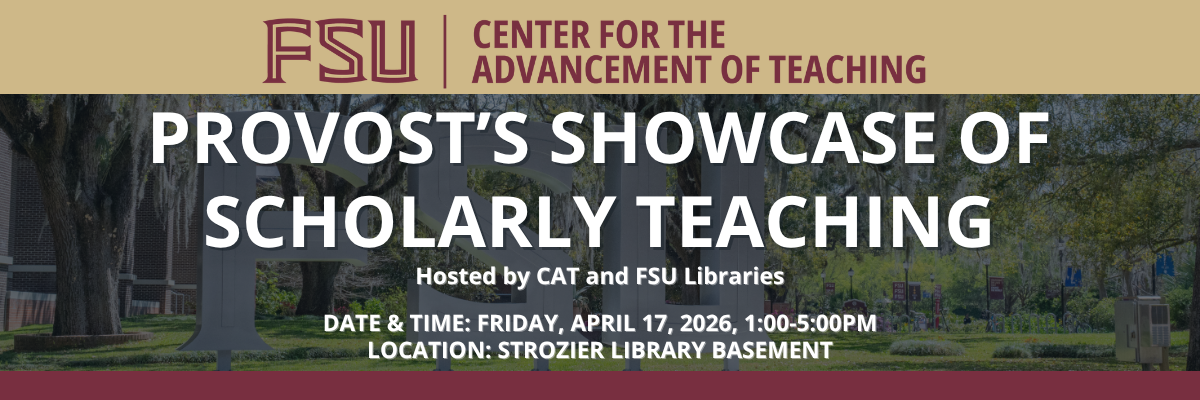Call for Proposals
Overview of the Provost’s Showcase
The third annual Provost’s Showcase of Scholarly Teaching (PSST) will be held on Friday, April 17, 2026. CAT, along with FSU Libraries, invites faculty members and graduate teaching assistants from all disciplines to submit proposals for poster presentations and roundtable discussions that advance innovative and effective teaching practices in higher education. We aim to foster a collaborative environment where participants can share evidence-based strategies, explore emerging trends, and address challenges in creating significant learning experiences.
If you have been developing teaching approaches or strategies that you would like to share with the larger campus community, we hope you will submit a proposal for a poster presentation. Or if you have a question—for example, one about teaching effectiveness, student engagement, or recent innovations in teaching—we hope you will consider hosting or attending a roundtable, where you can pose the question and explore possible answers with colleagues.
Even if you’ve never thought about presenting at a pedagogical conference before, you likely have insights worthy of discussion. We encourage you to submit a proposal and attend the showcase. Your proposed project can be in the following categories, though related topics are also encouraged.
- Facilitation of Learning: Strategies for guiding student engagement, such as active learning techniques, collaborative activities, technology-enhanced facilitation, and culturally responsive pedagogy, etc.
- Designing Learning Experiences: Innovative course and curriculum design, including blended/hybrid modalities, universal design for learning (UDL), open educational resources (OER), and integration of emerging technologies like AI or VR…
- Monitoring Students’ Learning: Assessment methods, feedback mechanisms, grading practices, and tools for tracking progress…
- Creating Optimal Conditions for Learning: Building supportive, welcoming environments, barrier removal, holistic student support, and fostering positive class climate…
Formats
There will be two presentation formats: poster presentations and round-table discussions. You may apply for only one format for each presentation. If you plan to apply for more than one presentation, you need to apply separately.
Poster Sessions
You can design a poster that summarizes the teaching innovation or scholarship that you would like to share. Your poster should include both text and figures (e.g., tables, graphs, diagrams, photographs). You will have time to present your poster and discuss your work with other participants, as well as visit other presenters to learn about their work.
If your own department has poster-printing facilities, you are encouraged to print your poster there. Otherwise, you can print one poster for each presentation of yours (if accepted) at the Digital Studio at FSU, free of charge. When we notify you of acceptance, we will provide further guidelines regarding the size and format of the posters.
Round Table Discussions
In this format you can share something you’ve been working on, get feedback and input from colleagues, and answer their questions about what you’ve been working on and why. You can also use this space to start a conversation about something that intrigues you, such as incorporating AI in teaching, or team-based learning. A roundtable is a particularly great format for starting a discussion about something you want to learn more about.
Roundtable discussions are not presentations; instead, they are very participatory and you can bring questions to engage your audience. Each round table discussion session will last for 50 minutes, but there will be a signal at the 25-minute mark for participants who wish to switch tables.
Eligibility
If you have taught (have been an IOR) at FSU or the FAMU-FSU College of Engineering, you are eligible to apply to present. You may have taught collaboratively, and so you may co-present with a colleague, or include a colleague as a co-author on your poster. Co-presenters and co-authors can be grad students, Learning Assistants, etc. If you have questions about eligibility, please feel free to connect with us via pro-teaching@fsu.edu to check.
Consult with Us
If you’d like to discuss your project or idea for the Provost’s Showcase, or if you would like more guidance on the application process, feel free to contact us at pro-teaching@fsu.edu
Information for Tabling Request
We also welcome offices/units who offer teaching and learning-related services to faculty or students to share information at special tables. If your office/unit would like to promote your services and resources by tabling at the 2026 PSST, please make a request by responding to Questions 1, 5, & 9 in the Application Form.
Application
If you plan to present your teaching, please fill in the 2026 Provost’s Showcase of Scholarly Teaching Application Form. To complete the form, you will need the title and abstract of your proposal. The abstract, 250-300 words, should include the following components: (1) contexts for the innovative teaching or classroom experiences you propose to present or discuss, such as course title, class size, course level, in person or online, (2) goals for the teaching innovation, what you did (or plan to do), (3) the effects (or desired effects) of using the teaching innovation, and (4) if accepted, your plan for how to engage audience. This abstract will be shared in the final program to help participants determine how your session will benefit them.
Application Due Date: Feb 1, 2026
Acceptance Notification Date: February 16, 2026
Please click the link below to send in your application:
(or copy/paste this link into your browser URL bar: https://forms.office.com/r/vs02U9AV7S)

